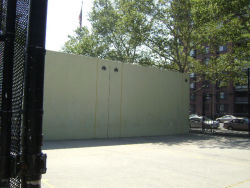Howard Bennett Playground
Howard Bennett Playground
What was here before?
This property was part of farmer John Meyer’s 108-acre estate. He purchased the property in 1825 and built his home at present-day Eighth Avenue and West 133rd Street in 1835, which remained until 1897. The property was ultimately divided into smaller lots and sold at auction.
How did this site become a playground?
This property was acquired by the City in 1954, when P.S. 197 was built, and opened as a playground in 1958. This playground is a Jointly Operated Playground (JOP) serving P.S. 197 and the local community. Beginning in 1938, the Board of Education agreed to provide land next to schools where the NYC Parks could build and maintain playgrounds that could be used by the school during the day and by the public when school is not in session.
In 1998, the site was upgraded with accessible play equipment. The renovation was assisted by volunteers from the Junior League of New York, P.S. 197, and the community, who worked with NYC Parks, City Parks Foundation, and the Horticultural Society of New York.
Who is this playground named for?
Howard Bennett (1911-1981) was a Harlem community leader and the founder of the National Citizens Committee for a Dr. Martin Luther King Jr. Holiday.
Bennett, one of 16 brothers and sisters, was born in Greenwich Village. After serving in the Pacific Theater during World War II, he became a leader of the 369th Veterans Association, the organization of members of the famous “Harlem Hellfighters.” He also served as Labor Chairman of the New York Branch of the NAACP and was a consultant and confidant of labor leader A. Phillip Randolph.
From the time of Dr. King's assassination on April 4, 1968, until his own death in 1981, Bennett campaigned persistently to make January 15, the birthday of the civil rights leader, a national holiday. Bennett and several friends conceived the idea while returning from Dr. King's funeral in Atlanta. After renting a storefront in Harlem, he enlisted the help of a few dedicated grassroots activists and began gathering signatures on petitions.
In April 1970, along with William Byrd and other members of the 131st Street Block Association, Bennett presented six million signatures to Brooklyn Congresswoman Shirley Chisholm and Detroit Congressman John Conyers. Chisholm and Conyers introduced a bill in Congress, which was finally passed in 1983. On November 2, 1983, President Ronald Reagan signed the law that made January 15 a national holiday in honor of Rev. Dr. Martin Luther King Jr. Since 1986, the holiday has been observed on the third Monday in January.
In 1977, he received an honorary degree of Doctor of Humanities from the Southeastern University of Greenville, South Carolina for his contribution to the civil rights movement. His last public act was to participate in the Solidarity March on Washington for Jobs on September 19, 1981.
Check out your park's Vital Signs
Clean & Safe
Green & Resilient
Empowered & Engaged Users
Share your feedback or learn more about how this park is part of a
Vital Park System





